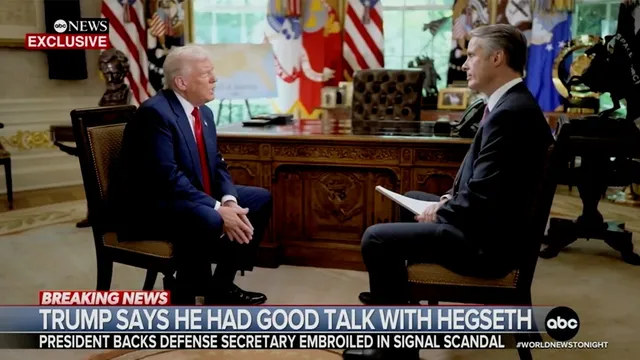
Trump backs Hegseth despite concerns over his leadership
2025-04-29 22:32- President Donald Trump expressed support for Defense Secretary Pete Hegseth during an ABC News interview, indicating his hopes for Hegseth's success.
- Hegseth faces scrutiny for communications practices involving sensitive military information, leading to increased calls for his resignation.
- Trump acknowledged the inevitability of errors in leadership positions, reinforcing the challenges of managing national security and immigration policies.
Express your sentiment!
Insights
In the United States, during an exclusive interview with ABC News, President Donald Trump conveyed confidence in Defense Secretary Pete Hegseth, amidst growing concerns regarding Hegseth's leadership and handling of sensitive military information. Trump stated that he hopes Hegseth will be a great defense secretary, despite scrutiny from the media regarding Hegseth’s use of the Signal messaging app for transmitting sensitive military information to unapproved individuals, including his wife. Critics assert that Hegseth's actions could jeopardize national security. Trump's support came in a week when calls for Hegseth's resignation surfaced due to reports of internal chaos and lack of oversight within the Pentagon. Trump indicated he had a positive conversation with Hegseth, rejecting outright confidence by saying, "Only a liar would say, 'I have a hundred percent confidence.'" This response highlighted Trump's acknowledgment of human error in leadership roles. The discussion also encountered issues related to immigration, where Trump remarked that there is an inevitability of mistakes in handling immigration cases, which he defends with robust enforcement policies. This included unfortunate deportations of U.S. citizen children, raising questions about the handling of deportations under Trump’s administration. The president stated that his second term is different as he focuses on running the country without the pressure experienced during his first term. This interview was part of a broader ongoing scrutiny over Hegseth's leadership, following departures of staff and questions about management within the Defense Department. Critics of Hegseth describe his tenure as chaotic, citing several aides' resignations and firings amidst the growing turmoil within his office. Trump reaffirmed his support for Hegseth in a public appearance together in Michigan, indicating his backing in front of military personnel to bolster Hegseth's credibility despite the backlash he faces from some quarters.
Contexts
The Trump immigration policy and deportations have been pivotal elements of the former administration's approach to immigration reform and enforcement. From the onset of his presidency in January 2017, Donald Trump embarked on a series of aggressive actions aimed at reshaping the United States' immigration landscape. Central to these efforts was the prioritization of deportations, which were especially directed at undocumented immigrants with criminal records, though later, the scope expanded to include broader categories of undocumented migrants. The policies included the implementation of the 'zero tolerance' policy, which resulted in the separation of families at the border and drew widespread condemnation from human rights organizations and the general public alike, revealing the contentious nature of Trump's approach to immigration enforcement. In addition to increased deportations, the Trump administration sought to curtail legal immigration through various measures. This included the restriction of asylum claims, travel bans targeting specific countries, and the termination of the Deferred Action for Childhood Arrivals (DACA) program, which had previously protected young immigrants brought to the U.S. as children. The administration justified these policies on the grounds of national security and public safety, arguing that these measures would deter illegal immigration and protect American jobs. Critics, however, argued that such policies exacerbated human suffering, violated international norms, and damaged the foundational values of the United States as a nation of immigrants. Throughout Trump's time in office, the deportation numbers saw a significant increase, with Immigration and Customs Enforcement (ICE) and Customs and Border Protection (CBP) agents becoming more active in communities across the country. The annual number of deportations, particularly in 2018, highlighted the administration's commitment to its hardline stance. Many undocumented immigrants faced raids and detentions in their homes and workplaces, prompting fears and a climate of anxiety among immigrant communities. The impact of these policies extended beyond enforcement actions, as they influenced broader public perceptions of immigrants and immigration policies in the United States. The long-term implications of Trump's immigration policies continue to shape the national discourse on immigration, as well as the legal framework surrounding it. While the Biden administration has pursued a markedly different approach, focusing on reversing many of Trump's policies, the ramifications of those years are evident in the political polarization surrounding immigration issues. The ongoing debates emphasize the necessity for comprehensive immigration reform that balances security with humanity, advocating for a system that recognizes the contributions of immigrants to society while ensuring the rule of law. As the conversation evolves, it remains critical to reflect on the balance between enforcement and compassion in immigration policy.